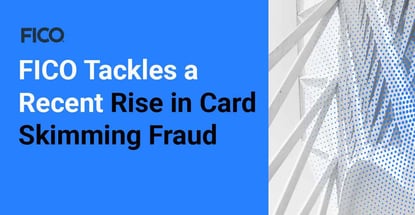
Our experts and industry insiders blog the latest news, studies and current events from inside the credit card industry. Our articles follow strict editorial guidelines.
In a Nutshell: Cases of card skimming are on the upswing at ever-increasing rates. Skimming is one of the biggest challenges for both consumers and financial institutions. FICO is working with banks to solve and prevent instances of skimming. It uses advanced software technology, like the Card Alert Service and Falcon Fraud Manager, to inform banks of suspicious activity. FICO also advises consumers to proactively monitor their accounts and use alert systems to catch fraudulent charges.
Card skimming occurs when a criminal obtains personal data from ATM, debit, or credit cards as consumers use their cards at an ATM machine or a merchant location. Once the information is collected, criminals can start making fraudulent charges and depleting victims’ bank accounts.
It is an insidious crime and has become more sophisticated over the years. FICO has reported that card skimming fraud grew by over 700% in the first half of 2022.
As with other fraudulent activities, skimming is a major problem for consumers and financial institutions. It is disruptive to the customer experience as well as to institutional operations.
In fact, this writer just had to reissue his credit card after being notified of fraudulent charges.
FICO’s Senior Director of Product Management, Debbie Cobb, said that consumers may be unaware their card has been skimmed until it’s too late and a fraudulent transaction has resulted in stolen funds from their account.

Organizations can also fall victim to skimming, and just one skimming instance can result in simultaneous losses for multiple customers. Cobb said FICO has seen a single case of skimming affect several hundred cards.
Unfortunately, banks can have secondary effects with fraud issues as well. Some banks may not be eager to publicly report these types of security breaches as it could affect their reputation, in addition to the various costs associated with fraud complaints and reissuing customer cards.
Cobb said skimming has been around for many years as debit cards have grown in popularity through the ‘80s and ‘90s. “I believe the trend is picking back up for two reasons. First, in person commerce has picked up dramatically in recent months following a slowdown from the COVID-19 pandemic. Second, criminals are known to opt for a path of least resistance when it comes to fraud,” she said.
While card-not-present (CNP) fraud has taken center stage in the financial industry, criminals are finding various means of obtaining large numbers of cards with a single event.
Cobb said that in addition to card-related fraud such as skimming, the significant increase in person-to-person instant payments through platforms like Zelle and Venmo has created newer opportunities for criminals.
These criminals will trick customers into sending money to a scam account. They do so by acquiring stolen credit card numbers on the dark web and attaching those cards to accounts on digital wallet apps like Zelle or Venmo. Then they send money to hundreds or thousands of people, while claiming it was sent by accident, and then request the sender to return the money.
Cobb said the prevalence and volume of these newer payment channels is causing an increase in this type of fraud, which can have a significant impact to both banks and consumers.
FICO’s Role in Protecting Institutions
For over 30 years, FICO has been providing fraud management solutions to banks and was the first institution to use artificial intelligence and machine learning to detect fraud incidents.
FICO currently offers banks a full suite of fraud management solutions that range from application and payment fraud to financial crimes, such as money laundering.
Since the mid 90s, FICO’s Card Alert Service has been analyzing ATM network activity daily to identify points of compromise that indicate a skimming event.
Whenever the Card Alert Service detects an event, FICO immediately warns the banks or financial institutions it may affect. Doing so allows those institutions to quickly take action and help the customers who may be impacted.
FICO’s Falcon Fraud Manager enhances fraud detection by using machine learning scores to warn banks of high-risk card and payment transactions. It also works in conjunction with the Falcon Compromise Manager, which identifies points of compromise with a specific focus on card-not-present activity.
Cobb said FICO sees debit card activity far surpassing credit card activity, which shows that consumers tend to prefer debit cards.
But whether they use debit cards or credit cards, consumers will have similar legal protections.
In the case of credit card fraud, the Fair Credit Billing Act prohibits creditors from taking action that can adversely affect the consumer’s credit standing until an investigation is completed. And for debit cards, the Electronic Funds Transfer Act allows consumers the right to stop payment of a preauthorized electronic fund transfer and the procedure to initiate such a stop payment order.
“The difference is in funds availability and how quickly the financial institution reimburses any losses,” said Cobb. “Many financial institutions will provide a provisional credit to the consumer’s account while a fraud investigation takes place to minimize any impact or disruption to the consumer.”
How Financial Institutions Can Combat the Trend
Financial institutions play an especially important role in ensuring consumers are protected against fraud. They not only are expected to be diligent in protecting their customers from financial crimes, but financial institutions must maintain good faith with customers. There’s nothing that creates less confidence and trust in a bank than being unable to prevent fraud.
The 2021 FICO Consumer Fraud Survey shows that 27% of consumers said they would change financial institutions if they felt unsatisfied with a bank’s response to incidents of fraud, and a further 56% would complain to the bank.
“Effective fraud management is a delicate balance between managing losses and protecting customers while avoiding disruption,” said Cobb. “Banks should employ fraud checks when authorizing transactions and follow up with customers when suspicious activity is identified.”
She recommended a number of strategies that banks can put into action. That includes lowering limits for out-of-area transactions and enforcing stricter criteria for approving fallback transactions. The fallback transactions would be for consumers using the magnetic stripe instead of a PIN.
Cobb also suggested incorporating non-monetary activity in connection with a payment or withdrawal. FICO has observed that balance inquiries often preceded fraudulent transactions.
Another suggestion would be to include recent prior activity that may have taken place at a higher risk terminal or device. Some of FICO’s data indicates there is a higher prevalence of skimming at non-bank ATMs, including those consumers may find in convenience stores.
Another strategy Cobb recommended is to evaluate transactions against the customer’s typical patterns. “If a customer routinely withdraws $40 in a common location, a $500 withdrawal in a new location would be suspicious,” she said.
Customer Awareness is Critical For Prevention
Even though financial institutions are a critical safeguard to preventing card fraud, education is a consumer’s first line of defense. In the same 2021 FICO survey, 24% of consumers reported their top concern was a criminal using their credit or debit card details.

“Consumers can help the fight by being aware of the devices they’re using and avoid transacting at any machine that looks like it might have been tampered with and notify their financial institution,” said Cobb.
She said consumers can take precautions when entering their PIN, like covering the digital pad to avoid any cameras that may be collecting information.
It is also useful for consumers to learn the importance of monitoring their accounts and maintaining regular accounting habits.
Banks can even assist with the process. Many financial institutions offer notifications on various transaction types. By setting up such preventative measures, customers would then be able to proactively alert their bank if they notice any concerning activity.
“While financial institutions are critical to protecting customers, consumer education and awareness can certainly help,” said Cobb.


![7 Best Credit Cards for Recent College Graduates ([updated_month_year]) 7 Best Credit Cards for Recent College Graduates ([updated_month_year])](https://www.cardrates.com/images/uploads/2018/05/grad.png?width=158&height=120&fit=crop)

![7 Ways to Manage Credit Card Debt When Rates Rise ([updated_month_year]) 7 Ways to Manage Credit Card Debt When Rates Rise ([updated_month_year])](https://www.cardrates.com/images/uploads/2023/01/Ways-to-Manage-Credit-Card-Debt-When-Interest-Rates-Rise.jpg?width=158&height=120&fit=crop)
![15 Disturbing Credit Card Fraud Statistics ([current_year]) 15 Disturbing Credit Card Fraud Statistics ([current_year])](https://www.cardrates.com/images/uploads/2020/08/shutterstock_576998230.jpg?width=158&height=120&fit=crop)



